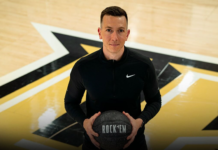What would you do if you were told that one hamburger requires 660 gallons of water to produce – the equivalent of 2 months’ worth of showers?
How about that 2,500 gallons of water are needed to produce 1 pound of beef?
Knights BARC offered a free screening of the documentary Cowspiracy: The Sustainability Secret in the College of Sciences Building, Room 101 Thurs. Mar. 26 at 5:30 p.m. Students could enjoy vegan snacks and prizes upon answering questions varying from what song was playing before the screening to statistics quoted from the film.
The founder of Knights BARC, Hunter Menning, 21, hosted the screening to raise awareness and educate people about animal agriculture’s affect on the environment.
“So now that people are educated they can make their own decision based on their values,” Menning said.
Menning, a business management major, started BARC in summer 2014.
“I’m really hoping there’ll just be like this word of mouth kind of buzz viral effect of everything that people learned,” Menning said.
Other UCF environmental groups attended the Cowspiracy screening, as well as fellow BARC club members and those who were told about the screening in passing. Such environmental groups are I.D.E.A.S. for UCF, Campus Peace Action and Don’t Shop, Adopt.
Cowspiracy: The Sustainability Secret is a feature-length environmental documentary following filmmaker Kip Andersen as he uncovers information about the agricultural industry and investigates why the world’s leading environmental organizations are too afraid to talk about it.
According to the film, “Animal agriculture is the leading cause of deforestation, water consumption and pollution, is responsible for more greenhouse gases than the transportation industry, and is a primary driver of rainforest destruction, species extinction, habitat loss, topsoil erosion, ocean “dead zones,” and virtually every other environmental ill. Yet it goes on, almost entirely unchallenged.”
As Andersen approaches leaders in the environmental movement, he increasingly uncovers what appears to be an intentional refusal to discuss the issue of animal agriculture, while industry whistleblowers and watchdogs warn him of the risks to his freedom and even his life if he dares to persist.
“First, I just wanted to really raise awareness about the cause. So now that people are educated they can make their own decision based on their values,” Menning said.
The film raises awareness to viewers that there may only be about 50 years left of society as we know it if we don’t enforce a change.
Menning pointed out that although this information is scary, rather than freaking out for the next 50 years, it’s important to ask yourself what you are going to do to make a difference. The film caused Menning to want to live more sustainably, and to try to raise more awareness for the cause.
“It was a good turn out here, but I want to go back out on campus and just help students who couldn’t make it tonight to see what’s going on,” he said.
Menning became a pescetarian three years ago, and has since learned more and more about animal rights and the cruel practices occurring in different industries. This knowledge inspired him to start an environmentalist group, Knights BARC, on campus.
“And that’s when I would officially say I became an activist because before then I wasn’t telling other people what was going on. I just had this information in my own mind and I wasn’t sharing it,” he said.
Rather than simply handing out flyers or asking students to sign petitions, Knight BARC, also has semester-long goals that will have a positive long-term impact on UCF. This semester’s goals are to create vegan options in dining halls and to sever ties with Sea World on campus.
“Those goals are going to have a positive imprint for the span of time that UCF is here,” Menning said.
Freshman environmental studies major, Michelle Poletti, was told by a friend about Thursday’s Cowspiracy screening.
“One thing I’ll take away from the film is definitely the priority of how much of a negative impact farming has on the world,” Poletti said. “I already knew a lot about the organic farming and the GMLs, but I didn’t know much about the animal side of it.”
Her two favorite speakers featured in the film were Howard Lyman and Will Anderson.
Lyman is a former Montana cattle rancher and the founder of Voice for a Viable Future. Lyman is a world-renowned public speaker, author, and animal advocate. He is best known for being sued by the National Cattlemen’s Beef Association for speaking about “mad cow” disease on the Oprah Winfrey Show.
Will Anderson founded Greenpeace Alaska in Anchorage in 1978, and shortly thereafter, was appointed to the National Board of Directors of Greenpeace USA. Since then, he has had a long career in campaign management in both the environmental and animal welfare sectors for a number of organizations including Earth Island Institute and the Progressive Animal Welfare Society.
For more information on Cowspiracy visit www.Cowspiracy.com/About”>here.






